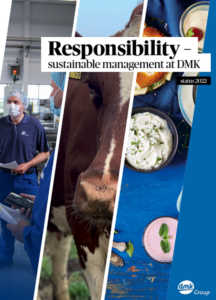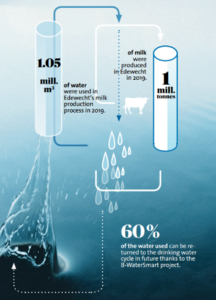Sustainability is here to stay and challenges food companies and retailers alike to transform their business models. As a market leader in Germany, DMK Group has been thriving in sustainability for more than a decade. The recently published report “Responsibility – Sustainability at DMK Group” shows a great panorama of past achievements and future tasks. DMK’s commitment to Science Based targets and the entry into the plant-based business are among the bold steps the dairy industry giant is taking – within a challenging market environment.
A long road gone already
DMK was an early sustainability mover – in 2013, a sustainability strategy until 2020 was established, covering the whole supply chain. Sustainability became a transformational lever for the dairy cooperative in several areas: DMK encouraged farmers to increase animal welfare and biodiversity through an incentive scheme within the unique Milkmaster program. The company engaged into initiatives to foster more sustainable feeding in the supply chain and later became market leader in GMO-free feeding across Europe. DMK also facilitated voluntary work for young farmers within the cooperative structure and participated in major industry initiatives to push transformation in the dairy sector.
All these initiatives were driven during a decade full of industry distortions, organizational restructuring, low milk prices and a decreasing number of farmers. Thus, not all initiatives reaped full potential, yet, sustainability never was at stance and entered the new 2030 vision.
Navigating in the midst of multiple sustainability demands
During all this time, stakeholders demanded ever more and different activities and standards from dairy companies. Customers, policy makers, industry associations, environmental associations and alike defined a whole bundle of diverse key topics and suggested a variety of approaches. Among retailers, for example, different husbandry system for milk and cheese were demanded. For DMK though, there is no such thing as a “drinking milk cow” or a “cheese cow”, because the milk from our farms cannot be processed separately by product group.
Many demands to increase the level of sustainability in our industry cannot be implemented without huge efforts. Restructuring farms to allow more space for cattle and gazing, increase local feed, decarbonize a carbon-intensive industry, develop recyclable packaging and so on requires investment, time and a clear direction.
DMK processes over six billion kilogrammes of milk per year, mainly for the mass market. Our task is to manage all the multiple demands in our business as cost-efficiently as possible and to support our farmers in the transition. We believe that our industry needs to find ways to mainstream and facilitate sustainability efforts across the value chain.
What’s ahead? Three examples
A major challenge is fighting climate change. We set ourselves the goal in the new sustainability strategy of reducing all greenhouse gas emissions by at least 20 percent by 2030. A further reduction from an already low starting point is not easy but is the right path for us. The major lever is farming. With our goals, we want to meet the ambitious Paris climate protection target. For this reason, we joined the Science Based Target Initiative (SBTi) in December 2021 who validates our climate goals. DMK again is one of the leading companies committing to SBTi in the industry.
Water use in milk processing is another topic in the industry. DMK’s Edewecht site seeks ways to handle drinking water responsibly within the EU “B-WaterSmart” project. The DMK site is seeking to treat the water extracted from milk in some technical processes to produce water of drinking quality and reuse it. The use of treated water conserves valuable groundwater. The special challenge and declared goal of the project is that the treated water should meet the quality requirements of the German Drinking Water Ordinance and therefore be safe for reuse in dairy factory processes.
A huge step for DMK was the entry into plant-based business in 2021. As a forward-looking dairy cooperative, we cannot and will not shut ourselves off from the trend towards non-dairy alternatives. How are we going to tap opportunities and at the same time take our farmers, who own DMK and who make their living from milk, along this route with us? We will opt for products with high value added and speciality segments. The DMK Group embedded plant-based alternatives to dairy products as strategic growth area in the “Vision 2030”. We presented concepts for vegan products at the ANUGA trade fair in 2021. One key area is the cheese product group. For example, a vegan cheese was presented which works very well in the food manufacturing industry. MILRAM and MILRAM Food Service for professional users are introducing vegan products for the retail grocery sector and innovative concepts with cheese, yoghurt, desserts and milk drinks.
After a decade of work in sustainability, we can conclude: In our cost-sensitive industry, it is crucial to build business cases for our sustainability efforts. Yet, some areas will need a long-term perspective and rigor even without obvious pay-offs, such as reducing emissions to combat climate change. Our experience to navigate challenges and changes while keeping our commitment to sustainability helps us to convince stakeholders and develop solutions. There is still a long way to go that needs support of many actors in the industry. It is necessary – and worthwhile!


